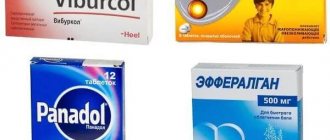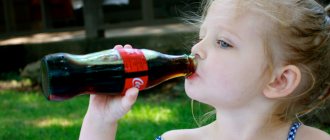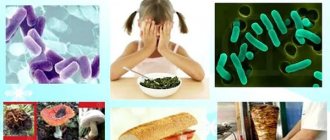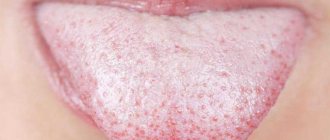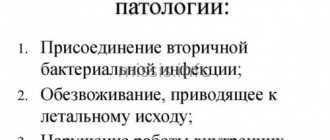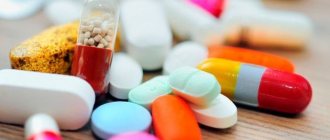Factors and symptoms
Intoxication with food, alcohol, and medications is often diagnosed. For what reasons is poisoning possible? There are enough reasons that can provoke the development of food poisoning.
Why does it happen:
- Eating poorly prepared meat, fish, poultry,
- Eating foods with expiring dates,
- Improper food storage
- Consumption of poisonous types of berries and mushrooms,
- Ingestion of fruits and vegetables treated with pesticides. (pesticide poisoning)
Often the cause of intoxication is the use of surrogates and low-quality alcohol. Chemical poisoning occurs as a result of ingesting vinegar. Poisoning is characterized by the presence of certain symptoms.
Signs:
- Disorders of the digestive system,
- Nausea, vomiting,
- Pain in the stomach, head,
- intestinal disorder,
- Increased temperature, febrile state,
- Increased separation of sweat, saliva, tears,
- Dry mucous membranes,
- Poor health, apathy,
- Nervousness, irritability,
- Loss of coordination, loss of consciousness,
- Sudden changes in blood pressure, changes in heart rate,
- Convulsive manifestations, tremors of the limbs.
If unpleasant symptoms appear, it is recommended to provide first aid to the victim and call a team of specialists. However, not in all cases the assistance of the treating staff is available. Therefore, you need to know what to take in case of poisoning and vomiting during home therapy.
Our information
Most cases of poisoning are caused by the rapid proliferation of Staphylococcus aureus and Escherichia coli in food products.
Poisoning is most often caused by low-quality products that have expired or those that were stored in inappropriate conditions or prepared in violation of sanitary standards. Poisoning is also often caused by poisonous mushrooms and plants collected and consumed through ignorance or carelessness.
Cleansing the body with liquid
When intoxication occurs, first of all, it is necessary to cleanse the body of toxic compounds and remnants of poor-quality food. Gastric lavage is required even if a person vomits spontaneously. What to drink in such a condition? For cleaning, clean water or a special solution is used. The procedure is quite simple.
Procedure:
- Prepare a solution of potassium permanganate in a weak concentration (light pink). It is allowed to replace drinking with a soda solution - one large spoon for a couple of liters of boiled water.
- How to drink potassium permanganate? The patient needs to drink up to four hundred milliliters of liquid.
- They provoke the gag reflex by irritating the root of the tongue.
- The procedure is carried out until the emerging liquid substance becomes free of impurities.
If the poisoned person does not vomit during intoxication, then it is possible to say that the toxic product has moved from the stomach to the intestines. There is no point in cleansing the stomach. Preference is given to laxatives; cleansing enemas are allowed. In such a situation, it is better to refuse traditional recipes.
It is impossible to stop diarrhea and vomiting if they are present, so the body independently tries to cleanse itself of the poison.
Food poisoning
In medical terminology, all food poisoning is divided into two main types:
- Microbial poisoning - appears due to bacteria of protozoan organisms;
- Toxic poisoning occurs when chemicals enter the body.
Food poisoning is always microbial in origin. Bacteria multiply in foods and dishes that have been insufficiently cooked or have already spoiled. After they enter the body, the process of acute intoxication begins. Poisoning can be mild and dangerous. That is why treatment should begin immediately after the first symptoms are detected.
Reception of sorbents
After cleansing the stomach, it is recommended that a person be given any sorbent. Such medications absorb the remaining toxic compounds from the stomach and intestines and help eliminate them. What medications are acceptable to take and what to drink if you have alcohol poisoning?
Allowed:
- Activated carbon. The medicine is used and known. How to take activated carbon in case of poisoning? The amount is calculated depending on the patient’s body weight. Take one tablet per 10 kg of weight. Drink once a day, treatment lasts up to ten days.
- Polysorb. Sold in powder form in bottles or sachets. It is recommended to drink according to the instructions for five days. In case of severe intoxication, it is allowed to use liquid to cleanse the stomach.
- Filtrum (Lactofiltrum). It is commercially available in tablet form. The medicine quickly rids the body of poisons and breakdown products of alcohol and medications. How to take filtrum or lactofiltrum in case of poisoning? In adults, the recommended amount is three capsules three times a day. In children, the dosage varies from one to two tablets depending on age. Drink with plenty of water.
- Enterosgel. A popular product containing methyl silicic acid. Available in paste and gel form. Penetrating into the stomach, the action quickly begins. Before use, the required amount of paste is dissolved in half a glass of water. The duration of treatment is up to five days. The dosage is described in the instructions for use. Young children are allowed to take the drug one teaspoon before meals.
Permitted sorbents also include Polyphepan, Smecta, and White Coal. You must carefully study the instructions for use; the drugs have contraindications. If used incorrectly, the risk of side effects cannot be excluded.
What can you eat if you have food poisoning?
On the first day of poisoning, a person will not feel hungry. This is explained by the acute symptoms of the disease, which simply exclude the desire to eat. The first day without food is a normal state. The main thing is to take enough fluid. It can be:
- Rice water;
- Drinking water;
- Solutions to restore fluid balance in the body.
Next, the patient will need to follow a strict diet, which will promote recovery.
From the second day you can drink weak tea and eat porridge with a thick texture. You can also cook fruit drinks and compotes from dried fruits.
If the condition begins to improve, then the diet also has relaxations. You can add boiled meat in small portions and steamed vegetables to your diet. Dishes should not be salty or spicy. It is better to give preference to stewed and boiled dishes.
You need to eat often and in small portions. Do not overload your stomach with too much food.
When the disease begins to recede and the symptoms subside, you should follow a minimal diet. Fatty, salty, flour products are excluded from the menu. It is also advisable to avoid coffee, carbonated drinks and crackers.
The diet after poisoning will last about a month. Until the body has fully recovered.
The diet should be combined with the intake of live bacteria, which will gradually restore the protective functions of the intestines.
Restoring water-salt balance
Intense vomiting and diarrhea provoke dehydration of tissues and cells. The water-salt balance fails, the blood becomes thicker, and few nutrients reach the organs. This poses quite a serious health hazard. Therefore, at home, it is important to try to normalize the water-salt balance.
Methods:
- The use of special products - Regidron, Oralit and others. How to take Regidron? The medication is diluted with water - one sachet per liter of liquid.
- A saline solution will help restore the balance of salts and fluids in case of poisoning. It is recommended to drink a simple remedy - a small spoon of salt per liter of water. You can add a spoonful of soda and sugar to the solution.
- Is it possible to drink tea if poisoned? If you have no appetite and to avoid dehydration, you can drink green or black tea without sugar.
- What water to drink if poisoned? It is recommended to opt for clean boiled water and drink mineral water without gas.
- Rosehip decoction helps a lot.
All liquids - medicinal or not - must be drunk slowly, in small sips, so as not to provoke vomiting.
Mechanism of occurrence and course of poisoning
The entry point for bacteria and their toxins in food poisoning is the mucous membrane of the stomach and intestines. For the development of pathology, an important condition is a large number of bacteria and toxins that enter the human body with food. In this case, the body is primarily negatively affected by toxins, which lead to the development of the following effects:
- Impact on the temperature regulation center located in the medulla oblongata, which leads to its increase.
- A decrease in the tone of all arteries of the body - a decrease in systemic blood pressure.
- Impact on the nerve receptors of the gastric and intestinal mucosa, leading to the development of a feeling of severe nausea followed by vomiting. In this regard, vomiting is primarily a protective reaction of the body aimed at quickly removing toxins from the stomach and intestines.
- Impaired absorption of water from the small and large intestines - develops with further penetration of bacterial toxins into the lower parts of the gastrointestinal tract, resulting in diarrhea (diarrhea). With timely medical care and adequate therapeutic measures, diarrhea does not develop, since the toxin is bound and eliminated from the body before it penetrates the large intestine.
- The development of an inflammatory reaction in the mucous membrane of the stomach, duodenum and small intestine is the result of the direct damaging effects of toxins on epithelial cells. In this case, a violation of parietal digestion, the synthesis of digestive enzymes and the absorption of nutrients into the blood develops.
Toxins of some pathogens (clostridia) can cause the development of inflammation in liver cells (hepatocytes) and necrotic-ulcerative changes in the mucous membrane of the stomach and small intestine in the form of local defects. Also, the pathogenesis of food poisoning can be accompanied by the direct effect of bacteria on the mucous membrane of the digestive tract, which attach to it and lead to an inflammatory reaction. This generally aggravates the course of food poisoning. With prolonged vomiting and diarrhea, dehydration (dehydration) develops in the body, caused by the loss of fluid and mineral salts. A significant loss of calcium and potassium salts leads to disturbances in the conduction of nerve impulses in neurons and neuromuscular synapses, which can cause the development of tonic-clonic spasms of skeletal muscles, disturbances in the rhythm of heart contractions (arrhythmias) and the functioning of the central nervous system and cerebral cortex (changes, confusion of consciousness up to its complete absence). A decrease in the volume of fluid in the body causes blood thickening and kidney failure (renal failure).
Treatment with medications
In case of poisoning, medications must be used.
The drugs help get rid of the manifestations of intoxication, normalize the functioning of inflamed organs, and reduce the risk of developing negative consequences. What pills to take in case of intoxication?
Medicines:
- To restore intestinal microflora, it is recommended to use Hilak Forte, Linex, Bioflor.
- In case of poisoning with fever, it is allowed to take antipyretic drugs - paracetamol, ibuprofen.
- Antimicrobial and antiviral agents are prescribed by a specialist; it is better not to take them on your own.
All medications must be taken according to the instructions for use in order to avoid negative consequences and complications.
List of medications for poisoning and diarrhea
Medicines for poisoning
When treating poisoning, an integrated approach is used; it is imperative to take sorbents and means to prevent dehydration; the choice of other medications depends on the symptoms that accompany intoxication.
Drugs to prevent dehydration
Regidron is a powder with a high content of sodium compounds, the best drug for preventing and eliminating dehydration in adults and children. The contents of one sachet must be dissolved in 500 ml of water, the total amount of solution is calculated taking into account the person’s weight - 10 ml/kg, this volume must be drunk in small sips within the first hour after poisoning. Then the dosage can be reduced to 5 ml/kg. Contraindications: renal failure, intestinal obstruction, cholera diarrhea. Average cost – 400–430 rubles.
Adsorbents
Sorbents are first aid for any type of poisoning; they help quickly cleanse the body of toxins, poisons, and bacteria. After taking it, the number of vomiting decreases, and there is a slight decrease in temperature, which often occurs during intoxication.
List of effective adsorbents:
- Activated carbon is a drug capable of absorbing more than 220 different toxins, which allows it to be used in various forms of mass poisoning and is safe for childhood intoxication. To begin with, you need to take 20 tablets one time, then take 10 pills every 2–3 hours for 3–5 days. Contraindications – taking antibacterial drugs, stomach and duodenal ulcers. Possible side effects - diarrhea, constipation, stool becomes black. Price – 60–70 rubles.
- Smecta is a good sorbent of natural origin with an enveloping effect, suitable for treating children, and is several times more effective than activated carbon. The contents of 1 sachet must be dissolved in 100 ml of water and drunk every 6-8 hours for five days. It should not be taken if there is constipation or intestinal obstruction; during treatment, flatulence and vomiting sometimes occur. Price – 150–160 rubles.
- Polyphepan is a wood-based sorbent that effectively removes chemical and toxic irritants. The daily dose is calculated taking into account the person’s weight, the severity of poisoning - 0.5–1 g/kg, it should be divided into 3–4 parts, the required amount should be dissolved in 100 ml of water immediately before use. Duration of treatment is 3–5 days. Contraindications: gastritis, tendency to constipation; allergic reactions may occur during treatment. Price – 75–80 rub.
Polyphepan - natural sorbent
Enzymes
Medicines from the group of enzymes help against food poisoning, and with alcohol intoxication - they reduce the load on the pancreas.
Mezim – protects the walls of the stomach from the negative effects of hydrochloric acid, accelerates the process of digestion of food, and eliminates the symptoms of intestinal infections. Adults and children over three years of age take 1–2 tablets with meals with plenty of water. Contraindications – pancreatitis, hypersensitivity to the active ingredients of the drug, intestinal obstruction. Possible adverse reactions are bronchospasm, increased lacrimation, skin rashes, nausea, diarrhea, epigastric pain. Average cost – 190–220 rubles.
Mezim is an effective remedy for poisoning
Festal is an effective drug that contains a set of active enzymes, but it can only be taken once, otherwise the pancreas may malfunction. Dosage – 1-2 tablets three times a day after meals for 5-7 days. Contraindications – hepatitis, pancreatitis, tendency to diarrhea, presence of gallstones, intestinal obstruction. During treatment, allergic reactions and dyspeptic disorders may occur. Price – 260–330 rub.
Medicines for poisoning and vomiting
Vomiting is a protective reflex, as the body tries to quickly get rid of toxic substances. But with severe food or alcohol poisoning, attacks can be frequent, profuse and uncontrollable, so it is necessary to take antiemetics and medications to slow down peristalsis.
Folk remedies
Traditional medicine is used with caution and care. It is possible to get rid of poisoning with the help of medicinal plants.
What is allowed:
- Decoction of oak bark - one large spoon of raw material per glass of water. Boil for fifteen minutes, dilute with water before use. This medicine helps normalize intestinal function and restore mucous membranes.
- A shot of vodka with salt has an immediate effect. Unfortunately, the mechanism of action of this medicine has not been studied.
- Peppercorns will help with diarrhea. Take one pea per kilogram of weight. Drink with a small amount of water.
- A couple of tablespoons of marshmallow roots are poured with cold water and left to steep for about four hours. Drink up to four times a day.
It is recommended to pay special attention to nutrition. What can you eat and drink if you are poisoned? All products that provoke irritation of the mucous organs of the gastrointestinal tract are excluded from the diet. It is recommended to limit the consumption of spices, fried, smoked, and fatty foods.
Is it possible to use kefir for poisoning? Low-fat fermented milk products have a beneficial effect on the digestive system and help normalize microflora. Therefore, drinking kefir in case of poisoning is allowed, but not immediately after cleansing the toxin.
Consequences and prevention
Depending on the degree and type of intoxication, the consequences vary. Quite often, exacerbation of chronic diseases and impaired renal and liver function are diagnosed.
Preventive measures include compliance with safety precautions and careful attention to food products. It is better to buy food in trusted stores, take medications as directed by a specialist and follow the instructions.
What should you take if you are poisoned at home? It is allowed to use certain medications that alleviate the human condition and normalize the functionality of organs.
Article rating:
Share with friends:
You may also be interested in:
Gasoline poisoning
Food poisoning during pregnancy - what to do, treatment methods
How does anesthesia affect the human body - types and consequences
Can adults and children eat apples if they are poisoned?
To avoid the consequences of eating poor quality food, you must:
- Avoid prepared foods (especially from suspicious people in unverified places), and do not look at tempting fast food signs. Memories of time spent in the restroom after poisoning help develop “immunity” against buying prepared foods in such places.
- Check expiration dates, appearance and smell of the product before use.
- Subject meat, fish, eggs and other products to long-term heat treatment.
- Wash vegetables and fruits thoroughly.
Top>>>

